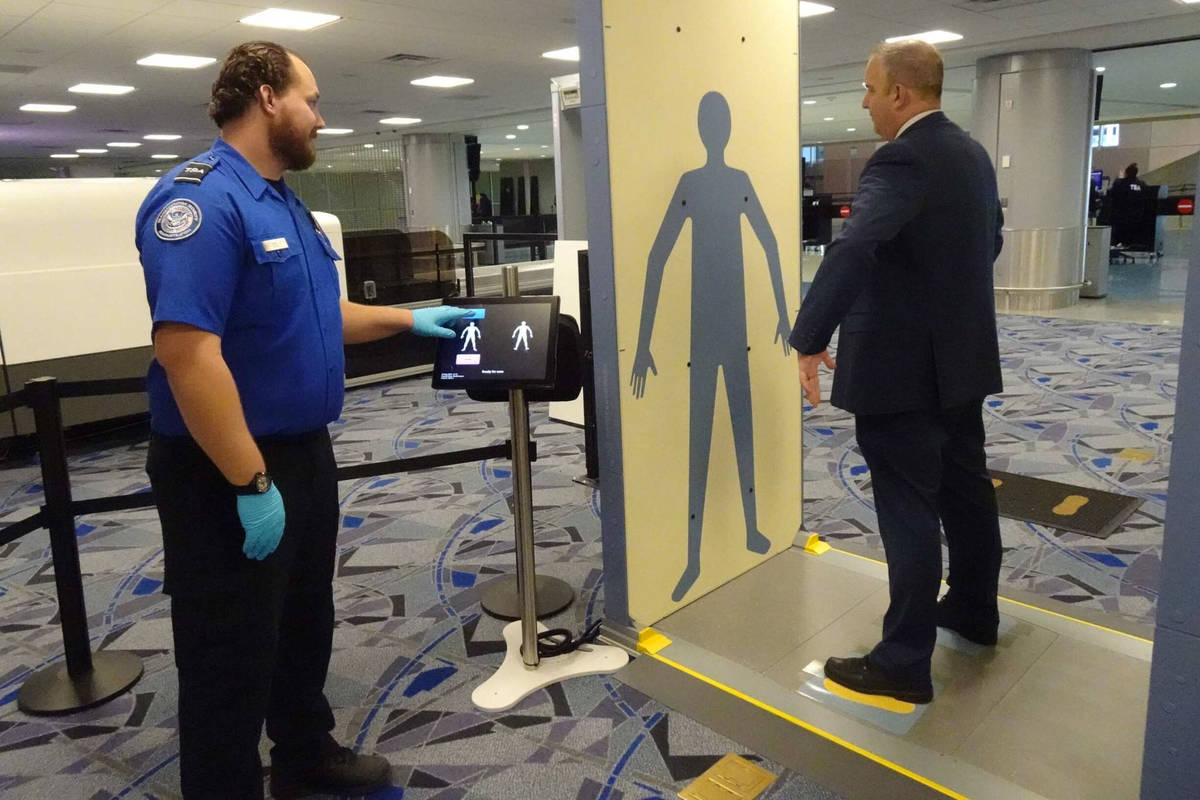McCarran’s Innovation Checkpoint reopens to test screening technology

As convention travel returns to Las Vegas this week with the World of Concrete show, McCarran International Airport and the Transportation Security Administration are making preparations to handle larger crowds.
On Monday, McCarran and the TSA reopened the Innovation Checkpoint in Terminal 3 where emerging technologies for screening passengers are tested and evaluated in a live setting. The checkpoint shut down in March 2020, following the halt to international travel.
The innovation checkpoint debuted at McCarran in 2019 on the zero level of Terminal 3 and is the first of its kind. It is open five days a week and is used as a supplement to the main security checkpoint located a level above.
“What we have been missing is the business travelers, conventioneers, who historically fill our hotel rooms during the critical mid-week periods,” said Clark County Director of Aviation Rosemary Vassiliadis. “We are well on our way to recovery at McCarran. With the conventions coming back it’s only going to become busier.”
Data collected from security demonstrations at the checkpoint will be used when pushing some of the technology into wider use at other airports.
The checkpoint features many of the same technologies as it did when it launched in 2019, but there are a few upgrades that have been added.
Four automated screening lanes were added to increase throughput, as well as safety. Passengers place their items in a bin and place it on a conveyor belt that takes the bin through the screening machine then out to where travelers retrieve their belongings.
On one of the four lanes the bins are run through a machine with UV light to sterilize the bins ahead of their next use.
“It provides ultraviolet light to the bin to kill any potential virus,” said Austin Gould, TSA associate administrator for requirements and capabilities. “It’s an enclosed system, very safe and it provides a degree of cleanliness that we weren’t able to provide before.”
Each of the four bin stations have a protective acrylic barrier between each section for an added layer of protection for both the passengers and TSA employees.
The checkpoint also features computer tomography baggage scanners with 3-D capabilities that allow a TSA agent to look at belongings virtually on a screen instead of having to check some bags manually. If agents deem a flagged item as safe, the process continues normally. If they deem an item requires further action, it’s diverted and manually inspected.
“We have always used these in checked baggage, but these machines are now small enough where we can actually put them in checkpoints,” Gould said. “It is true three-dimensional projection of the bag as opposed to our X-ray machines, which are only two-dimensional.”
Advanced body scanners that use millimeter wave technology to screen travelers for security threats also are in place at the checkpoint.
The units use a non-gender-specific algorithm that allows travelers to keep their hands at their side instead of holding them over their head like at other airport scanners.
The scanners provide corrective feedback to the TSA officer prior to scanning, which cuts down on incorrect positioning of a traveler, leading to a reduction in the number of pat-downs needed.
Additionally, the checkpoint uses credential authentication technology that requires travelers to present TSA agents with only their government-issued ID to verify their flight status.
The slot where an ID is inserted has now been turned around to face the passenger, to eliminate the need for an agent to handle travelers’ cards, an added measure tied to the agency’s COVID-19 response.
Lastly, the Innovation Checkpoint includes digital messaging signs that agents can update in real time to address any concerns, or flash important information or special messages.
“They’re eye-catching,” Gould said. “You can go through any checkpoint and see signs all over the place and not a lot of passengers always read them. This is much more eye-catching and it’s also dynamic; you can change it on the spot.”
Contact Mick Akers at makers@reviewjournal.com or 702-387-2920. Follow @mickakers on Twitter.